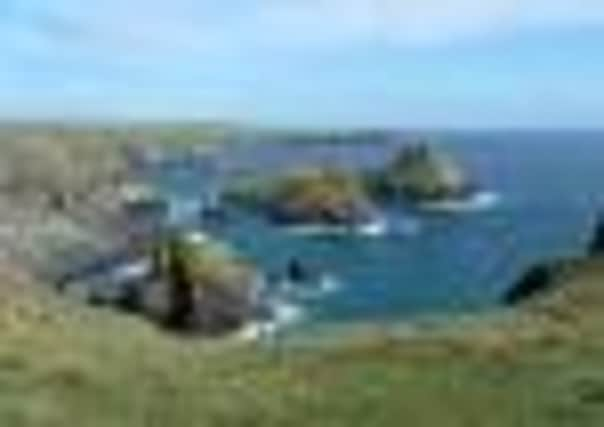Cabin fervour


Try it,” urged our genial host Alec. “This one’s different.” My partner repeated that she wasn’t keen on compost toilets, but it was clear Alec was on something of a mission. He led us from our shepherd’s hut down to the corner of the field to our private ablution trailer. And it did look clean and customer friendly – a simple but charming wooden cabin with a view along the hedgerow.
Back at our shepherd’s hut, we looked around at what was to be our home for two nights. It didn’t take long, but there was a reasonable sized double bed, a wood stove, a table, chairs and, most importantly, a welcome pack of Dorset shortbread. Outside was a shiny metal fire pit and a bag of logs. First impressions were good.
Advertisement
Hide AdAdvertisement
Hide AdIt was the start of a week-long journey across southern Cornwall in which we planned to turn our backs on hotels, bed and breakfasts and self-catering cottages. As well as our shepherd’s hut, we were looking forward to staying in a Romany caravan, a luxury bell tent and a room for couples in a youth hostel.


Our short stay in the hut at Treworgey Farm, near Looe, went fast. With several holiday cottages also on the site, the facilities were extensive. We played tennis, visited the pet livestock – hens, ducks, rabbits, guinea pigs, a horse and her foal, and a strange-looking pig – and made friends with the farm cat. Sadly the tennis match over-ran and we couldn’t find time for the swimming pool or the indoor beach volley ball court.
But alternative camping – if you can call this camping – is really about slowing down rather than speeding up. In the evening we sat outside in the stillness, enjoying a glass of wine and watching wood smoke drift gently up into the sky.
Nevertheless the next day we were up early. To get to our Romany caravan at St Keverne on the Lizard peninsular, we had a complicated journey ahead featuring three trains, a bus and a ferry. After crossing the Helford River, it was down to our own feet to complete the journey.
Advertisement
Hide AdAdvertisement
Hide AdWe joined the South West Coast Path which soon signposted itself straight across another creek at St Anthony-in-Meneage. At high tide you can call on a ferry boat, but at low tide it’s a case of taking off your boots and hoisting up your trousers as far as they will go. Sometime later, our trouser bottoms still damp, we reached the top of the last hill of the day, where gipsy caravan Rosie was waiting for us.
Brightly painted and surprisingly authentic, right down to the canvas doors, the wooden caravan took on the aura of a fairy grotto inside, with rich colours and the twinkle of tiny lights. Again there was a small stove in one corner but otherwise cooking facilities and a sitting area were in a more conventional caravan parked alongside. We were in two minds. The modern detracted from the traditional, but since it had started raining, we were quite happy to shut the door of our support caravan and settle down with our books.
The next morning it rained unceasingly and we were heading towards the most vulnerable of our alternative accommodation – a tent. But this was no standard tent. For a start, it had been put up for us. For three nights we were to stay in a bell tent provided by Posh Pitches. It had sounded ideal – camping without the work.
When we arrived, dripping wet, at Halanoweth Farm, near St Martin, our dampened spirits catapulted upwards as we unzipped the door. Inside was a fully made-up double bed, lanterns, rugs and low seating. Everything was clean and carefully presented. In a food caddy was another welcome pack of biscuits and, rather mysteriously, a pack of Taylor’s Yorkshire coffee. A cub tent outside held pots and pans, plates, a camping gaz cooker and firewood.
Advertisement
Hide AdAdvertisement
Hide AdFor our final night, we were booked in at Lizard Point Youth Hostel. A former Victorian hotel, it is perched on the cliffs and about as far south as it is possible to go in mainland Britain. Youth hostels have come a long way and this one even had a double bed.
The advantages of youth hostels are the modest cost and the chance to stay at some outstanding locations. We couldn’t take our eyes off the sea all day. Later, we didn’t need to because our room looked straight out into the great darkening blueness of sea and sky beyond. You have to share the kitchen, dining room and sitting room but this is easy because everyone is friendly. Neville, the volunteer warden, was helpful, making a heroic stab at unravelling bus times for the following day for us. And the toilets were good clean modern flushers too.
Getting there
Sebastian Oake stayed at Hideaway Huts at Treworgey, near Looe (www.hideawayhuts.co.uk), Gypsy Caravan Holidays at Tregaminion near St Keverne (www.gypsycaravanholidays.co.uk), Halanoweth Farm, near St Martin (www.helfordrivercamping.co.uk) using a bell tent provided by Posh Pitches (www.posh-pitches.co.uk), and the Lizard Point Youth Hostel (www.yha.org.uk/hostel/lizard-point).
Cross Country trains can take you direct from Yorkshire to Cornwall but for cheaper deals take an East Coast service to London King’s Cross and then First Great Western from London Paddington to the South-west. Book well in advance if you can.